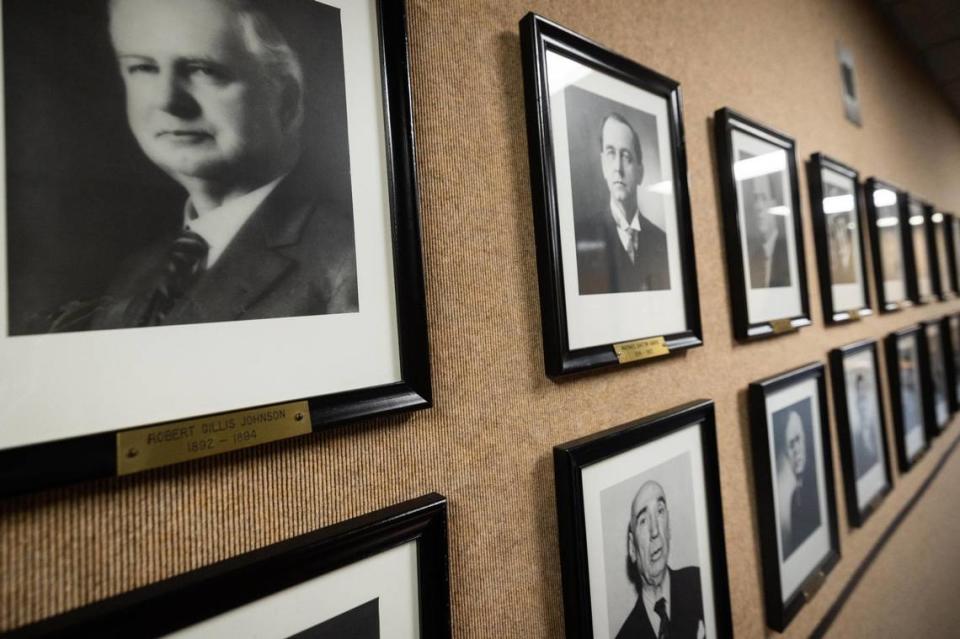What is a county judge? How the highest political position in Texas counties got its name
In each of Texas’ 254 counties, the person with the highest political prominence is the county judge.
The county judge oversees a four-person court of commissioners who each represent a precinct and make decisions on the county’s roads and infrastructure. While the position is called a judge, that person in Tarrant County doesn’t run the courts, nor can they send you to jail.
At times, residents have shown up to Tarrant County Commissioners Court with confusion about what exactly County Judge Glen Whitley does and where his authority lays.
So how did the position get its name and what does the county judge do? The name comes from history. The function depends on what part of Texas you’re in.
Where did the name county judge come from?
Even as politics change through the years, somehow the Archean name for the the lead county commissioner sticks.
The county judge is a constitutional position, said Peter McGuill, director for the V.G. Young Institute of County Government at Texas A&M. It was initially named chief justice and appointed by the Congress of the Republic of Texas to four-year terms, according to the Handbook of Texas. Chief justice was made an elected position in 1841 and the position’s term was shortened to two years in the Constitutions of 1845 and 1861.
The name of the position changed from chief justice to county judge under the Constitution of 1866, and the term became four years again, according to the Handbook of Texas. The county judge position was abolished three years later, and reestablished again under the Constitution of 1876 with two-year terms. The term jumped back to four years in 1954 thanks to a constitutional amendment.
McGuill said the position’s name comes from its function, which depends on the county’s size. In smaller counties, the county judge will have actual judicial duties, whereas in bigger counties like Tarrant and Dallas the county judge acts in more of an administrative role.
The county judge could act as a budget officer and have election duties, according to the Handbook of Texas. The county judge can also be an ex-officio school superintendent in places with less than 3,000 students.
McGuill acknowledges there’s some confusion about the position’s name if one doesn’t follow county government closely. But he doesn’t see the name of the position changing any time soon. Changing the name would take a constitutional amendment.

What does a county judge do?
The county judge’s primary job is to oversee the commissioners court.
In Tarrant County, Precinct 1 covers Crowley and Burleson in southwest Tarrant County and is represented by Democrat Roy Charles Brooks. Precinct 2 covers Mansfield and Arlington in southeast Tarrant County and is represented by Democrat Devan Allen. Precinct 3 covers north Tarrant County, including Keller and Southlake, and is represented by Republican Gary Fickes. Precinct 4 covers west Fort Worth and cities in northwest Tarrant County and is represented by J.D. Johnson.
The county judge is Whitley, a Republican from Hurst who has been in the position 15 years. He is not running for reelection.
The commissioners court makes decisions on the county’s infrastructure and where the county’s money goes. Commissioners decide what happens to the areas roads, what resources go to the public JPS Hospital System and how much residents are charged in property taxes. The county commissioners also make decisions about the Tarrant County Sheriff’s Department and the public health department. The commissioners in Tarrant County are not involved in decisions with the school districts.
Does the county judge get the most say on commissioners?
While the county judge is in charge of the commissioners court, they don’t get the final say in decisions, nor does their opinion matter the most.
Three people on the five-person court have to vote “yes” for an agenda item for it to pass. No one person’s vote counts more than another, which means there are times the county judge may be overruled if three people on the court disagree with them.
How will November elections affect commissioners?
November comes as a big election year for Tarrant County as three of the five commissioners step back from their positions.
Tim O’Hare, a Southlake attorney, is the Republican nominee for county judge. Democrat Deborah Peoples, who chaired the county’s Democratic party for eight years, is his opponent.
Commissioners Allen and Johnson are also not running for reelection, which means voters in Precincts 2 and 4 will pick their new commissioner on Nov. 8.
Voters in Precinct 2 will decide between Arlington NAACP president Alisa Simmons, a Democrat, and former Republican county commissioner Andy Nguyen. Voters in Precinct 4 have a choice between Fort Worth Police Association president Manny Ramirez, a Republican, and Democrat Cedric Kanyinda, who owns his own business.
Early voting begins Oct. 24 and runs through Nov. 4.

